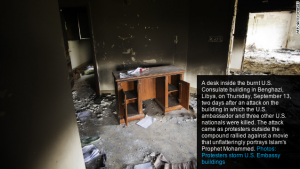There’s a weird bifurcation in the coverage of yesterday’s Libya tragedy.
The Islamist plot in Benghazi
One strand of coverage revised the initial claims that the mob that burned the consulate in Libya were responding solely to an anti-Mohammed film, The Innocence of Muslims. Jihadist chat rooms and–presumably–SIGINT made it clear that the attack on the consulate was planned in advance, probably as retaliation for the death of Abu Yahya al-Libi, whom we killed in a drone strike in June.
The officials said there were indications that members of a militant faction calling itself Ansar al Sharia – which translates as Supporters of Islamic Law – may have been involved in organizing the attack on the U.S. Consulate in Libya’s second-largest city.
They also said some reporting from the region suggested that members of Al-Qaeda’s north Africa-based affiliate, known as Al Qaeda in the Islamic Maghreb, may have been involved.
“It bears the hallmarks of an organized attack” and appeared to be preplanned, one U.S. official said.
Not only does it suggest that Moon of Alabama was (once again) right. But it also made me remember this post from All Things Counterterrorism, which warned that killing Abu Yahya al-Libi might make Al Qaeda even more extreme.
One seriously underplayed piece of evidence that this was planned is that after Consulate employees evacuated to a safe house and a helicopter of commandoes came to recuse them, they were ambushed at the purportedly secret location.
Capt. Fathi al-Obeidi, whose special operations unit was ordered by Libya’s authorities to meet an eight-man U.S. Marine force at Benghazi airport, said that after his men and the Marines had found the American survivors who had evacuated the blazing consulate, the ostensibly secret location in an isolated villa came under an intense and highly accurate mortar barrage.
“I really believe that this attack was planned,” he said, adding to suggestions by other Libyan officials that at least some of the hostility towards the Americans was the work of experienced combatants. “The accuracy with which the mortars hit us was too good for any regular revolutionaries.”
[snip]
Speaking of the rescue mission, he said: “A team of commandos arrived by air and went to a farm which we thought was a secret location. Once they got there, they came under heavy fire from heavy machine guns, rocket-propelled grenades and automatic rifles, which resulted in the death of two others.”
(Note, I’m not sure, but this may suggest two safe locations were compromised, an urban villa and a farm, each attacked with different weapons; I’m trying to clarify this. Update: Yes, two sites were compromised–apparently because the US shared the information with the Libyan militia.)
This suggests not only that professionals launched this attack with advance warning and serious weaponry (this is part of the reasons Libyans initially blamed it on Qaddafi dead-enders), but that they did it with either inside knowledge or incredibly good intelligence.
The Islamophobic plot in California
The second strand of coverage has puzzled through who was responsible for the film itself.
The film was made by a “Sam Bacile,” who claimed to the WSJ and AP to be Israeli. Then a “consultant” on the film, the militant Christian Steve Klein, refuted that claim, while claiming to know little of the film-maker’s real story.
Klein told me that Bacile, the producer of the film, is not Israeli, and most likely not Jewish, as has been reported, and that the name is, in fact, a pseudonym. He said he did not know “Bacile”‘s real name. He said Bacile contacted him because he leads anti-Islam protests outside of mosques and schools, and because, he said, he is a Vietnam veteran and an expert on uncovering al Qaeda cells in California.
[snip]
When I asked him to describe Bacile, he said: “I don’t know that much about him. I met him, I spoke to him for an hour. He’s not Israeli, no. I can tell you this for sure, the State of Israel is not involved, Terry Jones (the radical Christian Quran-burning pastor) is not involved. His name is a pseudonym. All these Middle Eastern folks I work with have pseudonyms. I doubt he’s Jewish. I would suspect this is a disinformation campaign.”
Then the AP figured out “Sam Bacile” is actually a Coptic Christian with 2010 check kiting conviction named Nakoula Basseley Nakoula who lied to them about his identity.
Nakoula Basseley Nakoula, 55, told The Associated Press in an interview outside Los Angeles that he was manager for the company that produced “Innocence of Muslims,” which mocked Muslims and the prophet Muhammad and may have caused inflamed mobs that attacked U.S. missions in Egypt and Libya. Read more →

